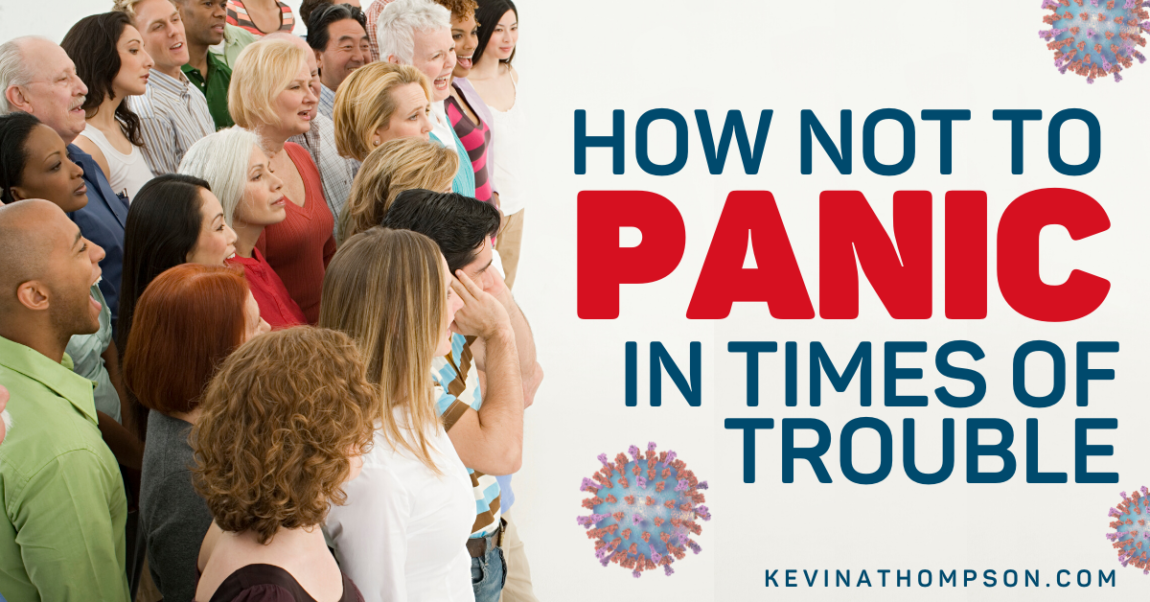“What do we do?” This is the most common question I have received since news began to spread about a global pandemic. Schools are closing, grocery stores are struggling to keep items on the shelf, and the 24-hour news cycle is bombarding us with what is taking place across the globe. In times like these, it is easy to be paralyzed by fear.
While we can feel fear, we cannot be ruled by it. Instead, we must be diligent in taking specific actions to protect ourselves and others.
Here is a three-pronged approach to today’s news:
Make wise choices. A lot of things are beyond our control, but not everything. When we fixate on those things we don’t control, we quickly begin to feel helpless. The challenge is to accept the things we don’t control but focus on those things we do control. It’s important in all circumstances to make choices, but it is vital during perilous times to grasp hold of those things we directly control and to make wise choices in those situations.
As we think about things, we must ask, “Do I control this or not?” If the answer is “no,” we should try to move our minds and energy toward the things we do control. During a pandemic, I can’t stop the spread of the virus or dictate what choices our school district makes regarding school. But I do control if my children attend, where my family goes, and how our home will respond. We control how we manage our anxiety and what voices we allow in our home (i.e. after you get the information you need, turn off the news). (See: How to Better Control Yourself)
Listen to the experts. We live in a day in which everyone not only believes they have a right to an opinion (and they do), but they actually believe all opinions are equally right (they aren’t). In every situation, some people know more than others. I have plenty of opinions about sports, but having never coached or played at a high level, my opinions about an offensive or defensive play call is pointless when compared to the actual coach. I have guesses regarding medical conditions, but having never been to medical school, you shouldn’t base any decision on my opinion. With a few degrees in pastoral ministry and a couple of decades pastoring a church, you might be wise to listen to my thoughts when it comes to ethical decision making.
In difficult times, it is vital to listen to the experts. When a worldwide pandemic is taking place, everyone is giving their opinion. Facebook is full of inside sources or responses from various people. But the true experts are few. Seek out the experts. It doesn’t guarantee that they will be right, but their opinions are far more valuable than everyone else. An MD’s opinion is more valuable than mine, but an expert in infectious disease has far more weight than your local surgeon. Find some experts and listen to them.
Trust God with the outcomes. While we control a few things, there are many things beyond our control. In those situations, we must trust God. The Christian story tells us of a God who is sovereignly in control over all things. He has the ability to work all things for our good and His glory. Nothing takes him by surprise. While He is not the author of evil, He can use even evil to accomplish His purpose. (See:When Life Seems Out of Control)
Trust does not mean we coldly like whatever happens to us. It means we accept the things we don’t control and assume God has allowed them so that we can better understand His love and be used for His work. When we fail to trust God, we spend a good amount of time either living in denial of what is taking place or worrying about the things we can’t control. A lack of trust causes us to get stuck, but the presence of trust allows us to accept what is happening to us and move forward through it.
We don’t know what the future holds. But just because tomorrow is uncertain doesn’t mean we are helpless today. If we focus on making wise choices, listening to the experts, and trusting God with the outcomes, we can navigate difficult days.




One Response to How Not to Panic In Times of Trouble